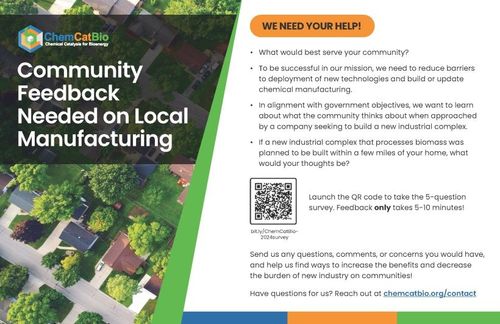ChemCatBio launches survey to learn about community response to new biorefining projects

SOURCE: U.S. Department of Energy
May 21, 2024
BY Erin Voegele
The Chemical Catalysis for Bioenergy Consortium (ChemCatBio), a consortium of the U.S. Department of Energy’s Bioenergy Technologies Office, has launched an effort that aims to gather community input on the development of new biomass processing facilities.
The consortium in April launched a voluntary survey that asks respondents to imagine that an industrial complex that processes biomass is planned for construction half a mile from their homes. The survey then asks the respondents to answer several specific questions, including those focused on the respondents’ general feelings on the proposed project, any questions they might want to ask, and any concerns they might have. Respondents are also asked what could be done to address their concerns and make the industrial complex a welcome part of their community.
The ChemCatBio consortium aims to help decarbonize the economy by accelerating the development of catalytic technologies to convert biomass and waste into renewable fuels and chemicals.
Advertisement
Advertisement
In announcing the survey, the consortium explained that to be successful in its mission it needs to reduce barriers to the deployment of new technologies. As part of that effort, ChemCatBio is working to learn about what communities think when approached by a company that wants to build a new industrial complex.
The consortium estimates the survey takes approximately 5-10 minutes to complete. Additional information is available on the DOE website.
Advertisement
Advertisement
Related Stories
President Trump on July 4 signed the “One Big Beautiful Bill Act.” The legislation extends and updates the 45Z credit and revives a tax credit benefiting small biodiesel producers but repeals several other bioenergy-related tax incentives.
CARB on June 27 announced amendments to the state’s LCFS regulations will take effect beginning on July 1. The amended regulations were approved by the agency in November 2024, but implementation was delayed due to regulatory clarity issues.
SAF Magazine and the Commercial Aviation Alternative Fuels Initiative announced the preliminary agenda for the North American SAF Conference and Expo, being held Sept. 22-24 at the Minneapolis Convention Center in Minneapolis, Minnesota.
Saipem has been awarded an EPC contract by Enilive for the expansion of the company’s biorefinery in Porto Marghera, near Venice. The project will boost total nameplate capacity and enable the production of SAF.
Global digital shipbuilder Incat Crowther announced on June 11 the company has been commissioned by Los Angeles operator Catalina Express to design a new low-emission, renewable diesel-powered passenger ferry.
Upcoming Events










